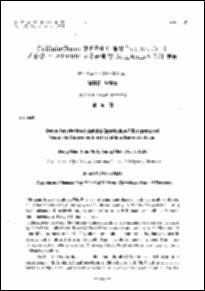Guillain-Barre 증후군에서 혈청 Interleukin-2, 가용성 Interleukin-2 수용체 및 Neopterin 농도의 변동
- Keimyung Author(s)
- Lim, Jeong Geun; Park, Young Chun
- Department
- Dept. of Neurology (신경과학)
- Journal Title
- 대한신경과학회지
- Issued Date
- 1994
- Volume
- 12
- Issue
- 2
- Abstract
- Guillain-Barre syndrome (GBS) is an autoimmune disease with an acute evolution of inflammatory demyelinating polyradiculoneuropathy. Although the precise immune mechanisms and involved antigens are uncertain, both humoral and cellular immune mechanisms are thought to be involved.
Interactions between the various compartments of the immune system are governed by cytokines. Laboratory investigations have shown that immune activation can be quantified by measurement of cytokines and soluble immune activation products in serum. Interleukin-2(IL-2) is probably the best characterized among the many cytokines and soluble interleukin-2 receptor (sIL-2R) and neopterin are major immune activation products.
In order to observe activities of cellular immunity of GBS, we measured serum concentrations of IL-2, sIL-2R and neopterin in 28 patients with GBS and in 22 healthy controls. Serial serum samples were drawn 2 to 25 days after motor onset of the disease, 2 to 3 days after treatment with plasmapheresis and 43-300days of follow-up.
The occurences of IL-2 positive serum samples were 41.7%, 23.8% and 18.2% in each time in GBS but none in healthy controls. Initial serum sIL-2R and neopterin level were elevated in 21% and 17% of patients with GBS compared with healthy controls. After plasmapheresis, both serum sIL-2R and neopterin level were significantly elevated in GBS compared with initial serum samples and healthy controls.
Thus, T-cell and macrophage activation may play a role in the pathogenesis of GBS. However, further study is needed to evaluate the effect of plasmapheresis and clinical severity on the serum concentration of IL-2, sIL-2R and neopterin in GBS.
GBS에서 T세포와 대식세포의 활성도에 대해 조사하고 GBS과 세포성 면역반응과의 연관성을 알아보기위해 GBS 환자 28명을 대상으로 혈청 interleukin-2(IL-2), 가용성 interleukin-2 수용체(sIL-2R) 및 neopterin 농도를 측정하여 대조군 22명과 비교하였으며, 임상경과에 따른 상기 지표들의 농도의 변동을 조사하였다. 대상 환자로부터 혈액 채취는 혈장교환 전, 혈장교환 후 및 추적 후에 각각 시행되었다.
GBS 환자의 혈청에서 IL-2 검출율은 혈장교환 전, 혈장교환 후 및 추적경과 중 41.7%, 23.8% 및 18.2%인 반면에 건강대조군의 혈청에서는 IL-2가 검출되지 않았다. 혈청 sIL-2R 농도는 각각의 시기에서 434.4±183.88, 586.0±207.72 및 440.7±124.68 U/ml로 대조군의 366.9±106.49 U/ml에 비해 혈장교환 후 군에서만 유의하게 높았다(p<0.01). 혈장교환 전 환자의 혈청 sIL-2R 농도가 정상대조군보다 높은 경우는 21%(24례중 6례)였다. 혈청 neopterin 농도는 혈장교환 전, 혈장교환 후 및 추적 중 6.6±3.36, 12.2±10.38 및 5.8±0.9 nmol/l로 혈장교환 후 군에서 대조군의 7.4±0.84 nmol/l 보다 유의하게 높았다(p 0.05). 혈장교환 전 환자의 neopterin 농도가 대조군보다 높은 경우는 17%(24례중 4례)였다.
이처럼 GBS 환자에서 정상대조군에 비해 혈청 IL-2 검출율이 높고 sIL-2R 및 neopterin의 농도가 증가된 본 연구의 결과는 GBS의 병인에 T세포 및 대식세포의 활성화에의한 세포성 면역반응이 관여함을 시사한다. 그러나 혈장교환 및 임상적 경중도가 sIL-2R 및 neopterin 농도의 상관관계에 대해서는 앞으로 보다 많은 연구가 있어야 될 것 같다.
- Alternative Title
- Serum Interleukin-2, Soluble Interleukin-2 Receptors and Neopterin Concentrations in Guillain-Barre Syndrome
- Publisher
- School of Medicine
- Citation
- 임정근 et al. (1994). Guillain-Barre 증후군에서 혈청 Interleukin-2, 가용성 Interleukin-2 수용체 및 Neopterin 농도의 변동. 대한신경과학회지, 12(2), 279–288.
- Type
- Article
- ISSN
- 1225-7044
- Appears in Collections:
- 1. School of Medicine (의과대학) > Dept. of Neurology (신경과학)
- 파일 목록
-
-
Download
 oak-bbb-1655.pdf
기타 데이터 / 810.78 kB / Adobe PDF
oak-bbb-1655.pdf
기타 데이터 / 810.78 kB / Adobe PDF
-
Items in Repository are protected by copyright, with all rights reserved, unless otherwise indicated.